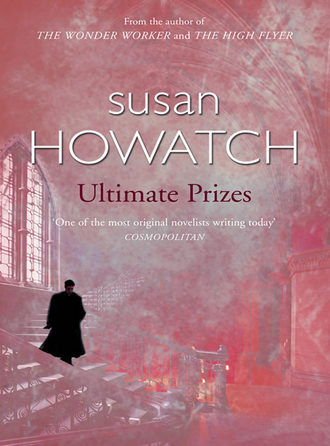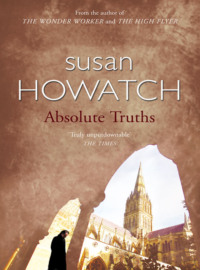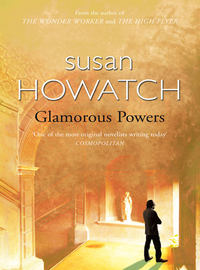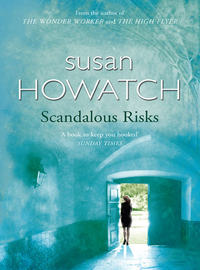
Полная версия
Ultimate Prizes
She stared at me. Her bright eyes were now opaque, suggesting endless layers of mystery beneath the artless candour of her conversation. All she said in the end was: ‘I wish I’d met you after Laura died.’
Recognizing the oblique appeal I said at once: ‘You must tell me about Laura,’ but at that moment we were interrupted by Alex, who was keen to lure Miss Tallent back into the general conversation, and her opportunity to confide in me was lost.
At last the stewed plums and the extraordinary custard were either consumed or abandoned, the ladies withdrew and the gentlemen, with the exception of General Calthrop-Ponsonby who had been mercifully reduced to silence by the legendary St Estèphe, began to talk in a desultory manner about current affairs. I was afraid the Dean would start talking about the Baedeker raids again, but instead he showed signs of wanting to resume our earlier theological discussion. I wondered if I ought to warn the Bishop that the Dean was drifting dangerously towards neo-orthodoxy. In my experience conversions to Crisis Theology – or indeed even to the more moderate forms of neo-orthodox thought – inevitably meant fire-and-brimstone threats from the pulpit and much embarrassing talk about sin, not at all the sort of clerical behaviour which would be welcomed by the visitors who attended services in the Cathedral.
‘… of course Niebuhr’s modifying Barth’s theology in important ways … If Hoskyns were alive today …’
I broke my rule about allowing myself only one glass of port, and reached for the decanter to drown my irritation.
By the time the Bishop led his flock to the drawing-room I was sagging beneath the impact of the Dean’s enthusiasm, but as I crossed the threshold my spirits revived. Miss Tallent pounced on me. My pulse-rate rocketed. I was aware of a reckless urge to take risks.
‘Will you think me terribly fast,’ said this dangerous creature whom I knew very well I had a duty to avoid, ‘if I invite you to walk with me to the bottom of the garden and gaze at the river? I feel I need a calm beautiful memory to soothe me during the next air-raid on Starmouth.’
‘What a splendid idea!’ I said. ‘Take me away at once before the Dean begins a new attempt to convert me to Crisis Theology!’
Could any response have been more inappropriate for a dedicated archdeacon?
‘What’s Crisis Theology?’ demanded Miss Tallent as we drifted discreetly outside on to the terrace. ‘It sounds thrilling!’
‘Do I look thrilled?’
‘No, you look wonderfully serene and austere – in fact I was thinking just now in the drawing-room how simply miraculous it is to stumble across a man who’s not utterly beastly. Speaking confidentially, Archdeacon dear, I’ll confess to you that the main reason why I’m not married is because men are in general so utterly beastly to women …’
By this time we had left the terrace and were wandering across the unkempt lawn towards the river which glittered beyond the willows. The moonlight was very bright. I thought of the Baedeker raids, and for a split second I prayed for Starbridge, perhaps under sentence of death for the crime of being beautiful, for the sin of earning two stars in a famous travel guide.
‘… and in fact I wouldn’t mind not marrying at all, but of course a woman has to be married if she wants to be a success in life, and I burn to be a success. So what am I to do? I’m twenty-seven years old. I’ve got to take action soon or I’ll wind up a spinster, and one can’t be a successful spinster, it’s a contradiction in terms. I did think of being a successful nun, but they keep such peculiar hours and I’m sure I’d hate being deprived of my silk underwear –’
‘I agree it does sound as if you’re not called to celibacy in the cloister –’ I somehow managed not to dwell on the image of Miss Tallent in her silk underwear – ‘but plenty of women are called to celibacy in the world and manage to live happy, successful, productive lives. The big question here is not, as you seem to think: how will society judge me if I don’t marry, but: what kind of life does God require me to lead?’
‘As far as I can make out, God just wants me to loaf around Starmouth fending off passes from drunken sailors.’
‘Fine. Keep loafing and fending and I’m sure the way ahead will eventually become dear.’
‘But dearest Archdeacon –’
Despite the drunken sailors I can’t quite understand why you’re so convinced most men are beastly to women.’
‘Well, it’s all that pawing and pouncing, isn’t it? Heavens, why I haven’t been pounded into dust years ago I really can’t imagine, and it’s entirely because most men can think of nothing but sex – sex, sex, sex, sex, sex – and it ruins everything, simply ruins it, and sometimes it all seems so sad I want to cry. But I’ll tell you this, Archdeacon dear: if I ever do marry it’ll be to someone high-minded who won’t just look at me and think: “What a nice pair of legs!” I can’t possibly settle for a man who isn’t high-minded, not possibly, anyone low-minded is quite unthinkable.’
‘If a man loves you he’ll see far beyond your legs. I mean – good heavens, what am I saying –’
‘But how do I know if a man loves me, Stephen? You don’t mind if I call you Stephen, do you, it’s such a good pure noble high-minded name –’
‘Miss Tallent, I hate to say this, but I think you’d be bored to death by someone high-minded. Think of that prig Arabin in Barchester Towers! Everyone agrees he’s quite the most tedious hero in Victorian literature.’
‘But if it’s a question of choosing between someone high-minded and someone who’s sex-mad –’
‘Why choose? Why not have someone high-minded and sex-mad?’
‘Heavens, what an amazing suggestion! But does such a man exist?’
‘The human race is infinitely diverse.’ I glanced back over my shoulder at the house. ‘Well, now that we’ve seen the garden by moonlight perhaps we should –’
‘But I want to go down to the river! I want to sit on that wooden seat underneath the willows and have an enthralling discussion with you on the heroes of Victorian literature!’
I looked at the wild garden shimmering in the pale light. I looked at the willow trees, swaying against the night sky. I looked at the glittering water of the distant river. I looked into the land of countless fairy-tales where the hero is changed from a frog to a prince by the casual wave of a magic wand, and I said: ‘Well, all right. But only for five minutes.’
As I had already confessed to her, I liked to live dangerously.
III
The river curled around Starbridge in a loop to divide the city from the suburbs, but at the point where the water glided past the Cathedral Close there were no buildings on the opposite bank, only water meadows, woods and farmland. The inter-war building developments had taken place on the other side of the city where there was no river and no need to build expensive bridges. The water meadows and fields, owned by the Dean and Chapter, were leased to the nearest farmer and bore silent witness to the fact that Starbridge, though a county town, was not an industrial centre driven to expand in all directions. The countryside remained unspoilt beyond the river, and the line of willows at the bottom of the Bishop’s garden completed the illusion that we stood many miles from a city.
‘This was a great garden in Bishop Jardine’s day,’ I said as we sat down on the ancient bench by the riverbank. ‘But when the gardeners went into the army Dr Ottershaw had no alternative but to sanction a wilderness.’
‘Much more exciting! I think the garden in Tennyson’s Maud could have been a wilderness, all tangled and steamy and exotic –’
‘I wouldn’t have thought a modern young woman like you would be interested in Victorian literature.’
‘It was the only thing our stupid governess knew about.’
‘You never went to school?’
‘No, and if I had I’m sure I’d have run away and begun my outrageous society life much earlier – with the result that I’d now be worn out. In fact if I’d been the heroine of a Victorian novel –’
‘Oh, you’d have died of consumption by now, no doubt about that,’ I said, making her laugh, and we began to talk of all the literary heroines who had paid the price demanded by society for the flouting of convention.
The conversation glided on, just like the river, glinting, glittering, gleaming, a hypnotic pattern coalescing into a unity beneath the white bright slice of the moon. Time glided on too, the time which should have been spent in the drawing-room, and every few minutes I told myself we should return to the house. Yet I never moved. The fairy-tale in which I was travelling had become more clearly defined; I now realized I was enacting the role of a male Cinderella and that when the clock began to strike twelve I would be compelled to flee from my princess, but meanwhile I preferred not to think of those inevitable midnight chimes. I thought instead how amazing it was that I, entombed in my sedate cathedral city, should be enjoying a scintillating dialogue with a society girl, and beyond my amazement lurked the absurd satisfaction that I, Norman Neville Aysgarth, the son of a Yorkshire draper, should be conversing in a palace garden with a millionaire’s daughter who had danced with the former Prince of Wales. I always tried hard not to slide into the repellent snobbery of the social climber, and of course I knew a good clergyman should be quite above such embarrassingly worldly thoughts, but the night was very beautiful and Miss Tallent was very amusing and I was, after all, only human.
The metaphorical midnight arrived so suddenly that I jumped. Far away by the house Charlotte Ottershaw called: ‘Dido! What have you done with Neville?’ and I saw my fairy-tale draw to a close.
‘I’ve ravished him!’ yelled Miss Tallent, and added crossly to me: ‘What a bore! Now we’ll have to return to the drawing-room.’
‘And I must be getting home.’ In my imagination I heard Cinderella’s clock relentlessly chiming the hour.
‘Must you? Already? But why?’
The moment had come. I had reached the point in the fairy-tale when Cinderella had been reclothed in her rags after her unforgettable night at the ball. ‘Miss Tallent,’ I said, ‘I’m sorry, I should have told you earlier but I’m hardly at liberty nowadays to keep late hours with charming young ladies. I have a wife waiting for me at my vicarage. We’ve been married sixteen years and have five children.’
For one brief moment she stared at me in silence. Then heaving a sigh of relief she exclaimed: ‘Thank God! Now I shall never have to worry about you pouncing on me, shall I? After all, what could possibly be safer than a married clergyman with five children?’
‘What indeed?’ I said, smiling at her, and that was the moment when I realized what a prize she was, so clever, so stimulating, so attractive, so rich, so celebrated and – most alluring of all – so utterly beyond my reach. The familiar powerful excitement gripped me; I was always deeply stirred by the sight of a great prize waiting to be won. Then I pulled myself together. This prize at least could never find its way into my collection. There was no other rational conclusion to be drawn. In my politest voice I said: ‘It’s been a great pleasure to meet you, Miss Tallent. I doubt if our paths will cross again, but I shall certainly pray that you find the happiness you deserve.’
‘Don’t be silly!’ She was aghast. ‘Isn’t it patently obvious that our paths are already divinely interwoven? As soon as you told me at the dinner-table that I was heroic I knew God had sent you to my rescue! Now look here. I want to begin a meaningful new life: I want to be good, I want to be wise, I want to be Christian. You can’t just say blithely: “I doubt if our paths will cross again,” and sail away into the night! Of course I know how busy you must be and naturally I wouldn’t want to take up too. much of your time, but if you could just write me a little spiritual note occasionally –’
‘But my dear Miss Tallent –’
‘You see, I feel I’ve reached the time of life when I simply must have a spiritual adviser. You can write and explain God to me – oh, and you must tell me all about Professor Raven and Bishop Bell and Archbishop Temple and all the really vital people whom I ought to know about – and that reminds me, talking of vital people, I’d simply adore to meet your wife. May I call at the vicarage tomorrow?’
I cleared my throat. ‘How kind of you to offer, but unfortunately my wife’s unwell at present. That’s why she didn’t accompany me this evening.’
‘What a pity! But perhaps next time I’m in Starbridge –’
‘I’m sure she’d be delighted to meet you,’ I said, diplomacy personified, but I already knew that Grace wouldn’t care for Miss Dido Tallent at all.
IV
No doubt I have now succeeded in conveying the impression that I’m a sex-obsessed, claret-mad, world-fixated ecclesiastic who deserves to be defrocked without delay. One always runs the risk of creating a false impression when one sets out for the purest of motives – honesty and humility – to portray oneself ‘warts and all’; the warts have a habit of commandeering the artist’s canvas. Let me now try to redress the balance.
First, I doubt if I’m more obsessed by sex than the average man. I admit this mythical ‘man on the Clapham omnibus’, as the lawyers call him, probably spends too much time thinking about sex, but the point I’m trying to make is that I doubt if I’m in any way abnormal when I meet an attractive woman and find myself picturing gleaming thighs. Nor need these harmless fantasies signify a tendency to immoral behaviour. A childhood spent among ardent chapel-goers ensured that I learnt early in life about the wages of sin, and out of an acute desire to avoid these terrible deserts I later acquired immense self-control in sexual matters. As a young man I was earnest, idealistic and chaste (more or less; one really can’t expect adolescent boys not to masturbate). Grace had been my first and indeed my only woman – apart from a disastrous lapse before my marriage when I had been an undergraduate up at Oxford. Embarrassment prevents me from disclosing much about this incident, so I shall only say that it followed my introduction to champagne and that the female was a shop assistant at Woolworth’s. From that day to this I can never cross the threshold of any branch of Woolworth’s without experiencing a small secret shiver of shame.
The truth is that on moral issues I hold views which are currently held to be old-fashioned. I believe fornication is degrading to women, who should be treated with the utmost reverence as befits their unique contribution to humanity as wives and mothers. Adultery I look upon not merely as a moral error but as a crime, breaking sacred promises, destroying trust, poisoning love, wrecking the lives not only of the guilty but of the innocent. Sex is like dynamite. If it is used in the right place and at the right time the results can be beneficial, but unless the proper regulations are observed there can only be a disastrous explosion. Those people who indulge in sexual activity as casually as they would down a couple of cocktails are always the sort of people who would find it amusing to play with matches in a bomb factory. As a clergyman I would be guilty of a most unchristian lack of charity if I bounded around yelling ‘Stupid!’ at all these fools, but I do find it an effort sometimes to treat the perpetrators of such mindless incidents – as a Modernist I won’t use that Victorian word ‘sinners’ – with compassion.
My strict attitude to sexual licence extends to the human race’s other pastime which causes so much trouble: drink. The Primitive Methodists of my childhood used to thunder away on that subject with as much verve as they devoted to sexual immorality, so it was hardly surprising that I became a most abstemious young man. In fact my catastrophic initiation into the pleasures of champagne up at Oxford shocked me so much that not another drop of alcohol passed my lips until the day I told Uncle Willoughby that I was going into the Church, but contrary to what the preachers had always proclaimed, this benign brush with whisky failed to consign me to perdition. I was much too poor to afford whisky regularly, and moreover as soon as I became a clergyman I knew I had to be careful in my drinking habits. Successful clergymen never drank spirits. Even as time passed and my tastes became more sophisticated I always made it a rule to drink moderately, and although I concede that on the evening of my meeting with Dido I bent this rule by tossing off an extra glass of port, this was an exceptional, not a commonplace, lapse.
I never drink twice a day. I do smoke, I admit, but never in public and only in my bedroom, usually after sexual intercourse. I like eating, but only wholesome food such as roast beef and Yorkshire pudding. I was brought up to believe that frivolous snacks, such as chocolate, stimulated the sin of gluttony and constituted an unforgivable extravagance. It was only when I was a young man courting Grace that I finally dredged up the nerve – and the money – to rebel against this austerity. I took Grace to the cinema and bought a box of chocolates. I can still remember the fearful guilty thrill of watching Clara Bow oozing ‘It’ as I sank my teeth into a sumptuous peppermint cream.
Now, no doubt, I’ve created the impression that I’m not a rake worthy of defrocking but a prig worthy of a kick on the bottom. How hard it is to get the balance of a self-portrait right! Let me stress that I try very hard not to be priggish. Christ came into this world to be at one with us, not to stand apart and look down his nose at our antics, and as a Liberal Protestant who believes strongly in the centrality of Christ I can hardly ignore the example he set. Certainly, despite my strict views on morality, I never feel morally superior. How can I, when every time I pass a branch of Woolworth’s I remember that I’m as prone to error as anyone else? Moreover although I have strict moral standards I don’t consider myself strait-laced, and I suggest that anyone who does consider me a trifle on the sober side has no idea what being strait-laced is all about.
Being strait-laced, as anyone brought up among strict Nonconformists knows, means not only spurning extra-marital sex, chocolates and the demon drink but avoiding the theatre, the cinema, the wireless, playing cards and novels. I have insufficient time and money to go often to the cinema or the theatre nowadays, but I enjoy playing cards with the children and I never miss the broadcast of ITMA, that most perfect of comedy programmes. I also read modern novels for relaxation. I may not read about sex in the News of the World; that would be dabbling with prurient trash. But I do read about sex in the work of D. H. Lawrence; that, I submit with all due respect, is keeping abreast of modern literature.
Grace enjoyed reading in the old days, but by 1942 her life as an archdeacon’s wife and the mother of five children barely allowed her enough time to open a book. At this point I must state unequivocally that Grace was the most wonderful woman in the world and the best possible wife for a clergyman and I adored her. I do want to make that absolutely clear. For sixteen years we had enjoyed the most perfect married life without a single cloud marring the marital sky. At least, if I’m to be entirely accurate, I have to admit little wisps of cloud did occasionally appear but they seldom lasted long. Even the most perfect marriages have to suffer little wisps occasionally. One is, after all, obliged to exist in real life and not between the pages of a romantic novel.
Garnishing my perfect marriage, like gilt lavishly bestowed upon the gingerbread, were my perfect children. I know that as their parent I may be judged hopelessly prejudiced, but people outside the family did constantly comment on my offsprings’ good looks, good manners, high intelligence and remarkable charm, so I venture to suggest I can’t be entirely deluding myself. Needless to say, it was a matter of the very greatest satisfaction to me that I had succeeded in winning two of the ultimate prizes of life: a perfect marriage and a perfect family.
Now I suppose I sound smug, worthy of another kick on the bottom, so let me add honestly that family life did have its ups and downs. However the problems never seemed insuperable and the children never seemed intolerable. My favourite was Primrose, who I thought quite beautiful, although I know men always view their daughters through rose-tinted spectacles, particularly when they have only one daughter to view. Grace and I had called her Primrose in memory of the first flower I had given Grace many years before at St Leonards-on-Sea, the genteel resort on the Sussex coast where my mother had spent her widowhood in the company of my sister Emily. My brother Willy and I had never lived at St Leonards; we had been boarded out in London in order to receive our education, but three times a year, at Christmas, Easter and in the summer, Uncle Willoughby had given us the money for the train journey to Sussex, and it was on one of these seaside holidays that I had met Grace, who was visiting cousins. I was seventeen; she was two years younger. When I gave her the primrose she kept it, pressed it, framed it and finally gave it to me on our wedding night seven years later. Even now the memento still hung over our bed. In view of this flagrant – but not, I suggest to any revolted cynic, unusual – sentimentality, it was hardly surprising that we should have decided to call our first daughter Primrose, and finally after the advent of Christian, Norman and James, Primrose made her grand entrance into the world. Our perfect family was now complete. All that remained for me to do was to work out how I was going to pay for the public-school education of three sons.
It was at this point that one of those little wisps of cloud appeared in the sunlit marital sky, and unlike all the other little wisps in the past this one failed to fade away. Grace and I discovered to our shock that Primrose had not after all completed our perfect family, and in 1941 Alexander (named after my mentor Bishop Jardine) arrived at the vicarage.
When I had finished accepting the will of God, just as a good clergyman should, I decided I would have to adopt a much more rigorous approach to contraception. This subject, I need hardly add, is one of the most awkward matters with which a clergyman can ever become involved. As far as I can gather, everyone in the Church practises contraception, even bishops, but no one in a clerical collar will ever admit to such behaviour because the Church can never surmount its ancient conviction that interfering with procreation is a bad thing. The last Lambeth Conference had barely softened this negative attitude, and a vast amount of hypocrisy had attended the debates on married life. It was noticeable that those bishops who thundered most eloquently on the evils of contraception were always the celibates. The married bishops with their neat little families of two or three children tended to sink into a deafening silence.
Having been brought up to believe God helps those who help themselves I had never agonized over the rightness of contraception; it had always seemed plain enough to me that it was my responsibility, not God’s, to protect my wife’s health, and so the question which bothered me most about contraception was not whether I should practise it but how it could be achieved. French letters may have been widely available since the end of the First War, but a clergyman can hardly be seen to purchase them. Nor can he seek help from his doctor who might be scandalized by such a questionable resolution of the Church’s murky official attitude.
I knew from the start of our marriage that the responsibility for regulating the arrival of children must be mine; it was inconceivable that Grace should be soiled by the knowledge which should belong only to fallen women, and after Christian’s birth I made the sensible decision to ignore the ancient religious disapproval of coitus interruptus. This form of contraception has a dubious reputation, but if one regards it as a discipline which is capable of developing one’s control and thus enhancing one’s performance, the obvious disadvantages soon cease to be intolerable.






